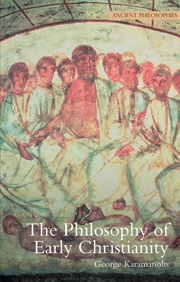Book contents
- Frontmatter
- Dedication
- Contents
- Preface
- Abbreviations
- Chronology
- Introduction
- 1 The Christian conception of philosophy and Christian philosophical methodology
- 2 Physics and metaphysics: first principles and the question of cosmogony
- 3 Logic and epistemology
- 4 Free will and divine providence
- 5 Psychology: the soul and its relation to the body
- 6 Ethics and politics
- Conclusion
- Appendix: the protagonists
- Notes
- Further reading
- Bibliography
- Index
3 - Logic and epistemology
- Frontmatter
- Dedication
- Contents
- Preface
- Abbreviations
- Chronology
- Introduction
- 1 The Christian conception of philosophy and Christian philosophical methodology
- 2 Physics and metaphysics: first principles and the question of cosmogony
- 3 Logic and epistemology
- 4 Free will and divine providence
- 5 Psychology: the soul and its relation to the body
- 6 Ethics and politics
- Conclusion
- Appendix: the protagonists
- Notes
- Further reading
- Bibliography
- Index
Summary
Galen, one of the most philosophically minded scientists of late antiquity, claims that Christians do not offer any proofs or arguments in support of their teaching since Moses and Christ “order them to accept everything on faith”. Galen makes this claim twice in his extant works, both times in passing. His aim was not to criticize the Christians directly but rather those who operate like them. In his anti-Aristotelian essay Against the First Unmoved Mover, which is preserved only in Arabic, Galen says:
Were I thinking of those who teach pupils in the manner of the followers of Moses and Christ, ordering them to accept everything on faith [pistis], I should not have given you a definition.
[Text 1]And in his treatise On the Difference of Pulses, Galen criticizes the theories of the doctor Archigenes, saying:
[H]e ought to have added to his assertion about the eight qualities a proof – or at least an argument – in order to avoid the impression that the reader, just as if he had entered a school of Moses or of Christ, was going to hear undemonstrated laws.
(On the Difference of Pulses, Kühn vol. VIII, 579 [Text 2])As the passages show, Galen does not criticize the Christians; he rather takes them to be the example that one must try to avoid of teachers who make claims without offering any proofs for them. As I said in the introduction, Galen is not alone in making such a point.
- Type
- Chapter
- Information
- The Philosophy of Early Christianity , pp. 117 - 143Publisher: Acumen PublishingPrint publication year: 2013

